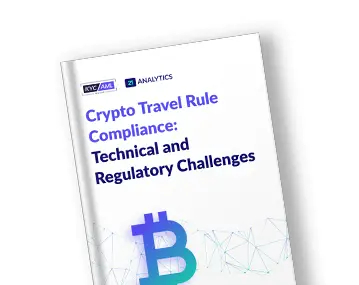Introduction
An increase in cryptocurrency and virtual asset adoption around the world is making international bodies and state governments regulate this asset class. While countries are introducing licensing regimes for virtual asset sectors they are also taking measures to bring the sector in conformity with AML/CFT (Anti-Money Laundering/Countering Financing of Terrorism) laws.
As part of AML/CFT compliance, states are implementing Crypto Travel Rule introduced by the Financial Action Task Force in 2019. Due to the unique nature of decentralized finance, the evolving regulatory landscape, and a lack of a unanimous approach to technological standards, there are challenges in the implementation of the Crypto Travel Rule.
KYC AML Guide whitepaper written in collaboration with 21 Analytics delves deeper into how Travel Rule Compliance requires VASPs (Virtual Asset Service Providers) to share information about the originator and beneficiary of the transaction with the counterparty above a certain threshold which can be 0 in some cases for example European Union and EUR 1000 in some cases, for example, United Kingdom. Furthermore, the information shared can differ depending on the requirements of each jurisdiction.
Information usually includes but is not limited to the name, address, and bank account number of the originator along with the beneficiary. Furthermore, VASPs are also required to perform counterparty VASP due diligence which may be a bit challenging in case the country party is a self-hosted wallet. Originator VASPs also have to verify the information of customers before sharing it with beneficiary VASPs.
Basically, as part of Travel Rule compliance, there is a need for secure, efficient, and speedy sharing of originator and beneficiary information between VASP, along with counterpart VASP due diligence which is a pre-requisite. However, challenges like the sunrise issue, lack of consensus on messaging protocols, and different regulatory approaches of jurisdictions, call for viable technological solutions which can take into account all those factors.
Along with discussing travel rule information-sharing requirements in a select few jurisdictions, and the status of travel rule compliance around the globe, the whitepaper also takes a brief overview of what could be an ideal travel rule compliance solution.

Get your copy
Please enter your information to download the content

